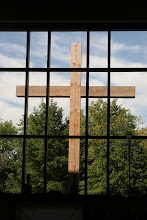
SnowCrystals.com
As Libbrecht says, perfection is quite rare. Jesus gives the rich young man a radical idea – a way to attempt human perfection. “Sell all your possessions and give your money to the poor.” And the rich young man walked away because he couldn’t do it.
What is Jesus doing to us when he speaks these difficult, law-like words? He is giving us commands that we can’t fulfill. We know that even if we sold everything and gave all of our money to the poor, we still wouldn’t be perfect.
It is an ideal. Jesus is teaching us that this is what we should strive for. He doesn’t call our wealth evil, or make any judgment on wealth at all. What Jesus is calling evil is what our wealth is doing to us – causing us to be dependent on what will not save us, instead of trusting completely in him. He is teaching us that we need to change our focus, to change our definition of what gives us life.
Perfect or not, we are not saved by what we do, or by what we give, or by what we have. We must learn to trust God, who loves us so much in our beautiful imperfection that he overlooks what we can’t do, even as he rejoices in what we actually do. It is impossible for us, but all things are possible with God.
“Snow crystals are wonderful examples of nature’s art, even as they are wrapped in the cold winds and dreary skies of winter. When you stop to notice them, snowflakes are a delight to find on your sleeve and are absolutely fascinating when viewed under a microscope. Their complex structures grow and develop as they tumble through the clouds, each design ephemeral and never again to be repeated.” (p. 111, Libbrecht)
Jesus said to him, "If you wish to be perfect, go, sell your possessions, and give the money to the poor, and you will have treasure in heaven; then come, follow me." When the young man heard this word, he went away grieving, for he had many possessions. Then Jesus said to his disciples, "Truly I tell you, it will be hard for a rich person to enter the kingdom of heaven. Again I tell you, it is easier for a camel to go through the eye of a needle than for someone who is rich to enter the kingdom of God." When the disciples heard this, they were greatly astounded and said, "Then who can be saved?" But Jesus looked at them and said, "For mortals it is impossible, but for God all things are possible." (Matt 19: 21-26)
This morning I woke up at 5:30 to a barking puppy who needed to go out. I threw on a sweatshirt over my pajamas and out we went, into the snow. It was puppy’s first experience with snow. She was delighted, I was not.
But we live in Minnesota. We know that there are certainly a lot of wonderful thing about snow. In his amazing book “Snowflakes,” Ken Libbrecht writes, “Many people are under the false impression that all snowflakes are beautifully formed and all are almost inexplicably symmetrical. To dispel this myth, spend a mere ten minutes with a magnifying glass during any snowfall. The quintessential, well-formed snowflake is actually quite rare. The vast majority show imperfect symmetry, if they show much symmetry at all…. There are many potential problems that can interfere with symmetrical growth.” (p. 48)
This morning I woke up at 5:30 to a barking puppy who needed to go out. I threw on a sweatshirt over my pajamas and out we went, into the snow. It was puppy’s first experience with snow. She was delighted, I was not.
But we live in Minnesota. We know that there are certainly a lot of wonderful thing about snow. In his amazing book “Snowflakes,” Ken Libbrecht writes, “Many people are under the false impression that all snowflakes are beautifully formed and all are almost inexplicably symmetrical. To dispel this myth, spend a mere ten minutes with a magnifying glass during any snowfall. The quintessential, well-formed snowflake is actually quite rare. The vast majority show imperfect symmetry, if they show much symmetry at all…. There are many potential problems that can interfere with symmetrical growth.” (p. 48)
As Libbrecht says, perfection is quite rare. Jesus gives the rich young man a radical idea – a way to attempt human perfection. “Sell all your possessions and give your money to the poor.” And the rich young man walked away because he couldn’t do it.
What is Jesus doing to us when he speaks these difficult, law-like words? He is giving us commands that we can’t fulfill. We know that even if we sold everything and gave all of our money to the poor, we still wouldn’t be perfect.
It is an ideal. Jesus is teaching us that this is what we should strive for. He doesn’t call our wealth evil, or make any judgment on wealth at all. What Jesus is calling evil is what our wealth is doing to us – causing us to be dependent on what will not save us, instead of trusting completely in him. He is teaching us that we need to change our focus, to change our definition of what gives us life.
Perfect or not, we are not saved by what we do, or by what we give, or by what we have. We must learn to trust God, who loves us so much in our beautiful imperfection that he overlooks what we can’t do, even as he rejoices in what we actually do. It is impossible for us, but all things are possible with God.
“Snow crystals are wonderful examples of nature’s art, even as they are wrapped in the cold winds and dreary skies of winter. When you stop to notice them, snowflakes are a delight to find on your sleeve and are absolutely fascinating when viewed under a microscope. Their complex structures grow and develop as they tumble through the clouds, each design ephemeral and never again to be repeated.” (p. 111, Libbrecht)

